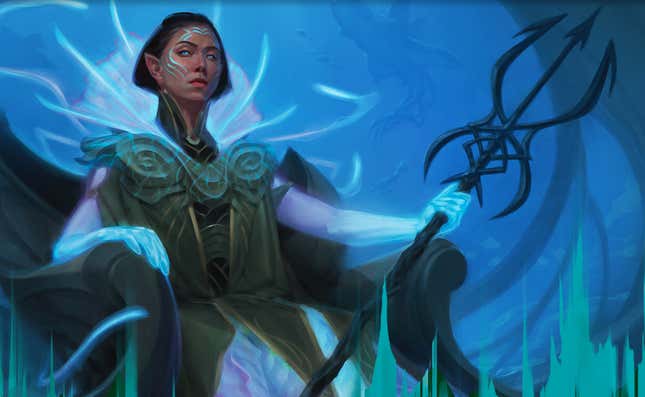
Magic: The Gathering is a game about slowly (or quickly) squeezing the life out of your opponent until they’re demoralized, defeated, and feeling the weight of their many, many mistakes. That’s why I am unhappy with the lot of you serial conceders depriving me of that.
I’m not a great player of Magic Arena, the latest digital adaptation of the 26-year-old card game. I’ve been known to forget that a creature has vigilance or keep a game-changing Instant spell in my hand until the match is well over and the lights have been turned off. But like everybody who plays something a lot, sometimes I win at Magic Arena. And a good number of those times, I get the satisfaction of watching my opponents’ health deplete to zero. Other times, they concede.
The “Concede” button is buried in a little menu on the top right of Magic Arena’s play screen. Despite this, it plays an outsize role in my daily games. Opponents will concede when I play a second Planeswalker. They’ll concede when I have too many flying creatures they can’t yet block. They’ll concede when I tap eight mana for a big, chonky worm creature or when I rapidly gain health. It happens a lot.
Some possibilities: These serial conceders are gifted with psychic powers (or hacking skills), which grant them complete knowledge of every card or play possibility. Or maybe they’re just great number-crunchers and ought to play poker instead.
I accept some of these concessions—if the opponent hasn’t drawn mana since turn one or if my goblin army is staring down their three remaining hit points, for example. Personally, I’d rather lose than concede unless it looks like the game will go on for all eternity. Opponents who concede early obviously don’t feel this way.
I want to give these Magic Arena players a pep talk. I want to grab them by the shoulders, shake them, and say, “Listen, man. Don’t be insecure. I’m not that good at this game. I promise you can kill the second Planeswalker.” I want to chide them for being wimps. “Come on. Really? I have 17 health. You have 15. We have literally the same creatures out.”
There have been games when my opponent, hovering at two health, musters all of their optimism and courage to stick it out. And sometimes, those opponents pull through and beat me. Kudos—that was hype. Other times, they don’t, and I experience the sweet feeling of a victory seen through. My master plan comes together (or luck blows a kiss my way), and I reap the rewards fair and square. Bliss!
I’m well aware that I won’t convince serial conceders to mend their ways by appealing to empathy. That’s not how the internet works. Think of it this way, though: A concession is not a natural conclusion; it’s a calculation meant to optimize time spent playing and winning. If things are looking grim, the serial conceder may intuit, conceding and moving onto the next game will offer more opportunities to win and more favorable conditions for doing so.
I have it on good authority that losing is fine—even educational. Losing is part of the game, even, and not something to overlook as useless. I also have it on good authority—not mine, but others’—that what differentiates Magic champions from chumps is the ability to turn a game around at the eleventh hour. My challenge to serial conceders: Stick it out. See what happens. Let me beat you.

